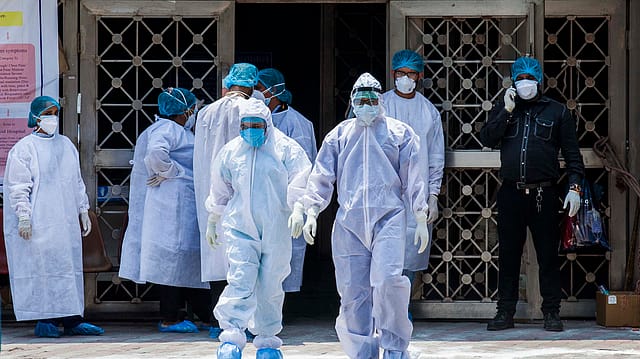Covid surge in China: Govt prepared to fulfil medicine, vaccine needs, says Mandaviya
ADVERTISEMENT

Union health minister Mansukh Mandaviya, in his address in Parliament today, said considering concerns around the Covid-19 surge in China, Japan, South Korea, and some of the western countries, India has stepped up the processes to make sure it is ready to meet any eventuality. "We are ready to fulfill the country's needs of medicines and vaccines. Nasal vaccine has been approved by the expert committee. This, too, has been developed by the scientists of India, which is an achievement," the minister said.
He said the government has started the random RT-PCR sampling of international passengers across airports, and is ready to fight the infectious virus. On a sudden surge in Covid cases in China, the minister said though there's no direct flight to India from China, and that the government is constantly engaged with global agencies like the World Health Organisation (WHO) and has stepped up testing efforts to track international passengers.
"We have started conducting 2% random sampling and all oxygen plants are working at full capacity, despite the low requirement. It is expensive to run the plant so we are running it on PPP mode so it can be used whenever the need arises. Medicines and its production review is being done."
The health ministry has, meanwhile, said a message circulating on social media and WhatsApp groups regarding the XBB variant of COVID-19 is "fake and misleading". The viral message says: "Covid-Omicron XBB is 5 times more virulent than the Delta variant and has a higher mortality rate than it".
According to the WHO, XBB is a recombinant variant of BA.2.10.1 and BA.2.75 sublineages. The global body has asked countries to closely monitor both the XBB and BQ.1 lineages as part of Omicron.
India is so far reporting a consistent decline in Covid cases, with the daily positivity rate at 0.01% as of December 22. However, three new cases of Omicron subvariant BF.7 have reportedly been detected in the country.
The central government has asked all states and Union Territories (UTs) to step up their vigil against Covid-19 cases and ensure that samples of all positive cases, on a daily basis, are sent to the designated Genome Sequencing Laboratories (lGSLs) that are part of the Indian SARS-CoV-2 Genomics Consortium (INSACoG) network spread across the country.
In a letter to the States and UTs, Union health secretary Rajesh Bhushan said it is essential to gear up the whole genome sequencing of positive case samples to track the variants through the INSACoG network.
The “Operational Guidelines for Revised Surveillance Strategy in the context of COVID-19” issued by the health ministry in June 2022 called for early detection, isolation, testing, and timely management of suspected and confirmed cases to detect and contain outbreaks of new SARS-CoV-2 variants. Hence, monitoring the trends of existing variants is of crucial importance, the health secretary said.
While around 35 lakh Covid-19 positive cases are reported around the world daily, India is having only around 1,200 cases on a weekly basis, the ministry data shows. The health secretary said India has been able to restrict the transmission of the Covid-19 virus through its five-fold strategy of test-track-treat-vaccination and adherence to Covid appropriate behaviour.